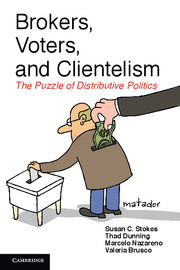Brokers, Voters, and Clientelism The Puzzle of Distributive Politics Cambridge Studies in Comparative Politics Series
Auteurs : Stokes Susan C., Dunning Thad, Nazareno Marcelo, Brusco Valeria

Thad Dunning is Professor of Political Science at Yale University. He is also a research fellow at Yale's Whitney and Betty MacMillan Center for International and Area Studies and at the Institution for Social and Policy Studies, and co-director, with Giovanni Maggi, of Yale's Leitner Program in International and Comparative Political Economy. He studies comparative politics, political economy, and methodology. His first book, Crude Democracy: Natural Resource Wealth and Political Regimes (Cambridge, 2008), won the Best Book Award from the Comparative Democratization Section of APSA and the Gaddis Smith Prize for the best first book on an international topic by a member of the Yale faculty. Dunning has also written on a range of methodological topics; his second book, Natural Experiments in the Social Sciences: A Design-Based Approach (Cambridge, 2012), develops a framework for the discovery, analysis, and evaluation of strong research designs.
Marcelo Nazareno is Professor of Political Science at the National University of Córdoba and Professor of Methodology and Public Policy at the Catholic University of Córdoba. He holds a PhD in social science as well as advanced de
Date de parution : 09-2013
Ouvrage de 344 p.
15.7x23.5 cm
Disponible chez l'éditeur (délai d'approvisionnement : 14 jours).
Prix indicatif 85,25 €
Ajouter au panierDate de parution : 09-2013
Ouvrage de 344 p.
15.2x22.6 cm
Disponible chez l'éditeur (délai d'approvisionnement : 14 jours).
Prix indicatif 38,06 €
Ajouter au panier


